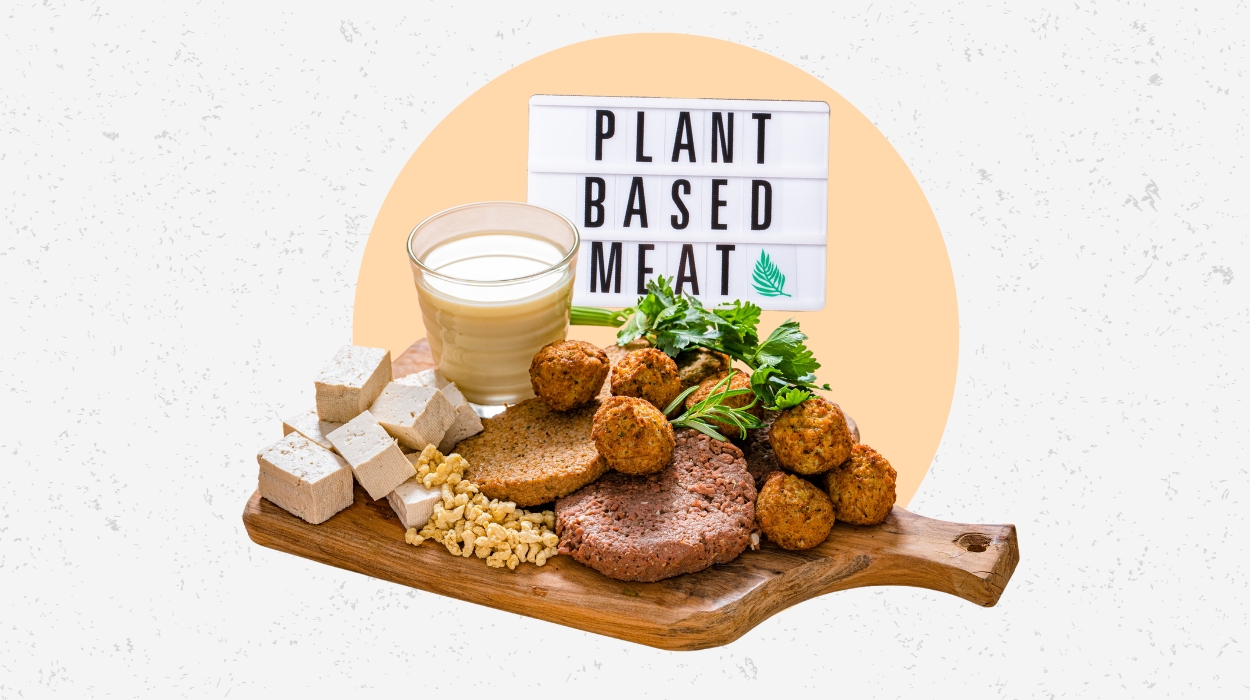 Expert's opinion
Expert's opinion
Expert's opinion
The article is a subjective view on this topic written by writers specializing in medical writing.
It may reflect on a personal journey surrounding struggles with an illness or medical condition, involve product comparisons, diet considerations, or other health-related opinions.
Although the view is entirely that of the writer, it is based on academic experiences and scientific research they have conducted; it is fact-checked by a team of degreed medical experts, and validated by sources attached to the article.
The numbers in parenthesis (1,2,3) will take you to clickable links to related scientific papers.
Is Plant Based Meat Healthy? Discover Its Pros & Cons In 2024

Picture this: Juicy burgers sizzling on a grill, with tender chicken nuggets and mouth-watering meatballs on a platter waiting to be devoured, all without a single animal involved! The rise of plant-based meat or plant based burgers is taking the culinary world by storm. You’ve heard the buzz about these healthy types of meat and how they might fit into a plant-based diet for weight loss. Is plant based meat healthy?
This article will address the burning question: “Is plant-based meat healthy?” We’ll dig into the nutritional benefits of plant-based meat, pointing out its cons, if any, and reveal some interesting facts that will help you make an informed decision about your next barbecue. Let’s go ahead and get to it.
Is Plant Based Meat Healthy For You?
Yes, plant-based meat is good for you. It can benefit a balanced diet, offering additional advantages such as reduced environmental impact and lower saturated fat content. However, it’s crucial to choose minimally processed options and be mindful of their overall nutritional composition.
Many of us are familiar with vegan protein bars or protein powder products, but now, many plant-based meat products are entering the market. While plant-based meat can be a healthy choice for many individuals, individual dietary needs, preferences, and overall dietary patterns should be considered to ensure a well-rounded and nourishing diet.
What Is Plant Based Meat?

Plant-based meat alternatives are products created to closely resemble traditional animal meat in flavor, appearance, and texture while wholly sourced from plants.
In recent years, vegan meat alternatives have become a revolutionary dietary trend that has skyrocketed in popularity.[1] As worries about the detrimental impacts of animal agriculture continue to rise, the need for healthier and more sustainable food options shines a light on meat alternatives.
These plant-based alternatives represent a remarkable shift in how we approach food production and consumption.
Pros And Cons Of Plant Based Meat
Considering its popularity over the years, weighing plant-based meat’s advantages against its potential drawbacks is essential. To make informed decisions about incorporating it into your diet, consider some of its pros and cons below.
Pros Of Plant Based Meat

Health Benefits
Compared to meat from animals, plant-based meats are often lower in calories, saturated fat, and cholesterol. Therefore, it can be beneficial to include a plant-based diet for diabetes and cardiovascular disease. Including plant-based foods as part of a healthy diet can improve your heart health, reduce your risk of developing certain conditions, and improve your general well-being.
Weight Management
In addition to containing fewer unhealthy fats, they are typically high in fiber and can provide essential nutrients like protein, vitamins, and minerals. Therefore, they can be great for weight loss. They are also less likely to include the hormones and antibiotics[2] frequently found in animal meat.
Allergen-friendly
Plant-based meats offer an excellent substitute for individuals with allergies or dietary restrictions. They are free from common allergens,[3] such as dairy, eggs, and shellfish, making them suitable for people with lactose intolerance, egg allergies, or those following a vegan or vegetarian diet.
Reduced Foodborne Illness Risks
Traditional meat production and consumption can carry the risk of foodborne illnesses,[4] such as salmonella, E. coli, or other bacterial infections. Plant-based meats made from plant ingredients are inherently free from these pathogens, minimizing the risk of foodborne illnesses.
Lower Risk Of Zoonotic Diseases
Zoonotic illnesses[5] are infections that can spread from animals to people. Since many infectious diseases are rooted in animal farming, plant-based meats may help reduce the danger of zoonotic disease outbreaks by reducing the market for animal products.
Animal Welfare
Plant-based meat lessens their suffering by removing the need to raise and kill animals. It offers a compassionate option for those who care about animal welfare and don’t want to support animal exploitation.
Environmental Sustainability
Compared to traditional meat production, plant-based meats have a substantially smaller adverse environmental impact. They use less energy, water, and other natural resources. Research[6] has proven that producing meat from plants reduces green water use by 21%, reduces the emission of greenhouse gases by 49%, and preserves biodiversity.
Cons Of Plant-Based Meat
Processing And Additives
Some plant-based meats are heavily processed and contain additives, raising concerns about long-term health effects. While generally considered safe, individuals may prefer minimally processed options for their plant-based diet.
Availability And Cost
Limited availability and higher prices[1] can make some plant-based meats less accessible and affordable than traditional meat options.
Allergies And Intolerances
Individuals with allergies or intolerances must still scrutinize the ingredient list of plant-based meats for potential allergens like soy, gluten, or nuts despite their overall allergen-friendly nature.
Sensory Experience
While plant-based meats have improved taste and texture, they may not meet everyone’s expectations. For some, the sensory experience of plant-based options may differ from animal-based meats.
How To Choose Nutritious Plant-Based Meat
If you are considering adding plant-based meat products to your diet but want to ensure you’re making nutritious choices, here’s a guide for you:
Read The Ingredient List
When choosing plant-based meats, prioritize those with minimal and recognizable ingredients, such as legumes, grains, vegetables, and natural spices, while avoiding excessive preservatives, artificial flavors, sodium, and added sugars.
Assess Nutritional Content
When assessing plant-based meat, review the nutrition information panel carefully. Look for limited saturated fats, cholesterol-free content, low sodium, ample protein and fiber sources, essential vitamins and minerals, and calories that align with your dietary requirements.
As is revealed in a recently published study, plant-based meat products should not be viewed as nutritionally interchangeable with animal protein sources. While they can be complementary regarding provided nutrients, we must still consider potential deficiencies until further technological developments arise.
Watch For Allergens
To ensure safety for individuals with food allergies or intolerances, thoroughly examine the allergen information of plant-based meats, avoiding products that contain allergens like soy, gluten, or nuts.
Check For Fortification
Enhance the nutritional value of plant-based meats by choosing fortified options that provide essential nutrients like iron, vitamin B12, and omega-3 fatty acids, which are particularly beneficial for vegans and vegetarians.[7] However, some fortified products cannot adequately meet your nutrition needs. In this instance, you may need to rely on supplements for plant-based diets to meet your micronutrient needs.
Price And Affordability
When selecting nutritious plant-based meats, cost and accessibility vary depending on the brand, ingredient quality, and manufacturing method. With persistent searching, you can find options that align with your budget.
Consult With A Registered Dietitian
A registered dietitian can provide personalized guidance and support considering your needs, individual characteristics, and preferences when incorporating plant-based foods and products.
What To Avoid On A Plant-Based Diet
When following a strictly plant-based diet, it is important to be mindful of certain foods high in saturated fat, sugars, or other unhealthy ingredients. The following items should be excluded from your dietary choices or consumed in moderation:
Animal Products
The foundation of a plant-based diet is the exclusion of all animal products. This includes meat, poultry, seafood, eggs, honey, and dairy products like milk, cheese, and butter.
Processed And Refined Foods
Minimize or avoid processed and refined foods, which often contain added sugars, unhealthy fats, and artificial ingredients. Choose natural sweeteners like fruit or moderate your intake of sweet treats.
Use herbs, spices, and natural flavorings to enhance the taste of your meals, and add dietary supplements if your diet needs a boost in nutrients.
Highly Processed Meat Substitutes
Some plant based meat substitutes may be highly processed and contain additives or excessive salt. Opt for minimally processed plant-based meats or whole food alternatives when possible.
Trans Fats And Saturated Fats
Limit unhealthy fats like fried foods, hydrogenated oils, and plant-based products high in saturated fats. Instead, opt for healthier fats like avocados, nuts, seeds, and plant-based oils.
Highly Refined Oils
Limit highly refined oils in a plant-based diet. Choose minimally processed options like extra virgin olive, avocado, or coconut oil in moderation.
Non-Vegan Additives
Read ingredient labels diligently to avoid non-vegan additives like gelatin, whey protein, casein, and animal-derived colorings in processed foods.
The Takeaway
Are plant-based meats healthy? In a nutshell, plant-based meat can be a healthy choice! It brings awesome benefits like being better for the environment, aligning with ethical values, and having less saturated fat. Just make sure to pick less processed options, read those labels carefully, and enjoy a variety of whole foods for ultimate health and happiness.
Frequently Asked Questions
Plant-based meat may have disadvantages regarding processing, additives, limited availability, higher cost, varying nutrition, and allergen-containing and non-vegan additives.
Determining whether plant-based meat is better than conventional meat depends on individual preferences, health goals, environmental considerations, and ethical values.
Plant-based meats may not be as healthy if they are highly processed, excessively refined, and possess unhealthy fat and excessive oil.
These products can be a healthy part of a balanced diet due to their cholesterol-free and lower saturated fat content, but overall nutritional balance is important.
+ 7 sources
Health Canal avoids using tertiary references. We have strict sourcing guidelines and rely on peer-reviewed studies, academic researches from medical associations and institutions. To ensure the accuracy of articles in Health Canal, you can read more about the editorial process here
- ResearchGate. (2018). Figure 1. The global market value of plant-based meat alternatives and… [online] Available at: https://www.researchgate.net/figure/The-global-market-value-of-plant-based-meat-alternatives-and-meat-Market-data-on_fig1_353004281
- Ghimpețeanu, O.M., Pogurschi, E., Popa, D.O., Dragomir, N., Tomița Drăgotoiu, Mihai, O. and Carmen Daniela Petcu (2022). Antibiotic Use in Livestock and Residues in Food—A Public Health Threat: A Review. [online] 11(10), pp.1430–1430. doi:https://doi.org/10.3390/foods11101430.
- Lopez, C.M., Siva and Mendez, M.D. (2023). Food Allergies. [online] Nih.gov. Available at: https://www.ncbi.nlm.nih.gov/books/NBK482187/
- Nychas, G.-J.E. and Panagou, E.Z. (2017). Meat Safety—I Foodborne Pathogens and Other Biological Issues. [online] pp.521–552. doi:https://doi.org/10.1016/b978-0-08-100694-8.00017-0.
- Espinosa, R., Tago, D. and Treich, N. (2020). Infectious Diseases and Meat Production. [online] 76(4), pp.1019–1044. doi:https://doi.org/10.1007/s10640-020-00484-3.
- Gibbs, J. and Cappuccio, F.P. (2022). Plant-Based Dietary Patterns for Human and Planetary Health. [online] 14(8), pp.1614–1614. doi:https://doi.org/10.3390/nu14081614.
- Neufingerl, N. and Eilander, A. (2021). Nutrient Intake and Status in Adults Consuming Plant-Based Diets Compared to Meat-Eaters: A Systematic Review. [online] 14(1), pp.29–29. doi:https://doi.org/10.3390/nu14010029.



